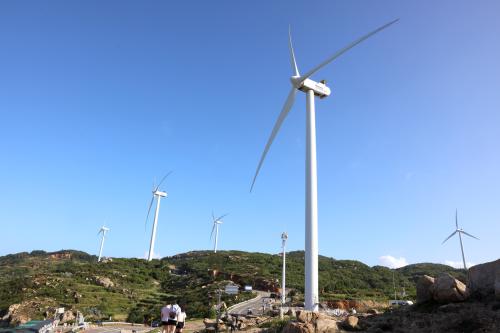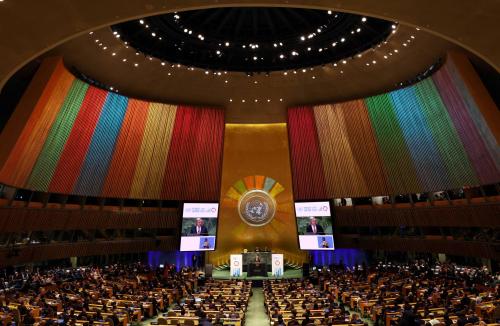Part of this commentary summarizes a recently published article. Some phrases or language may closely reflect the original text to accurately convey the ideas presented by the co-authors.
The United States ranks second after China in global greenhouse gas (GHG) emissions, accounting for 13.5% of the worldwide total, according to the World Resources Institute. During his first term, President Trump withdrew the U.S. from the Paris Agreement, a decision that President Biden reversed upon taking office. With the reelection of President Trump, there is a strong possibility he will once again withdraw the country from the Paris Agreement, potentially hindering global efforts to achieve carbon neutrality by 2050.
Corporate leaders have started to come to terms with the need to take climate action seriously, although support for such policies is far from universal. About half of the largest U.S. companies have made net zero emissions pledges, and more than 90% of S&P 500 companies now publish ESG reports. Yet, research has revealed the limitations of self-regulation. Extensive evidence shows that companies exploit the voluntary nature of climate disclosures to further their competitive interests through selective and biased disclosure—a practice commonly known as “greenwashing.
To mitigate greenwashing and improve market transparency, the U.S. Securities and Exchange Commission (SEC) recently introduced a groundbreaking climate disclosure law. “The Enhancement and Standardization of Climate-Related Disclosures for Investors,” which was adopted in March 2024 after a two-year delay, was intended to expand the scope of greenhouse gas (GHG) reporting among publicly traded companies in the U.S. The law could compel corporations to take climate-related risk seriously and integrate it with their governance and operational strategies. The use of mandatory standards could also reduce the problem of selective reporting and greenwashing, significantly improving the comparability and reliability of climate-related ESG data.
The importance of this regulation cannot be overstated: U.S. companies, including those in the energy and manufacturing sectors, are among the largest contributors to greenhouse gas emissions. It is estimated that 80% of global GHG emissions were produced by just 57 companies, many of which are based in or operate extensively within the United States.
The SEC’s regulation thus represents a landmark rulemaking effort that can help curb emissions in line with the ambitions of the Paris Agreement. However, the new law has faced significant criticism. The New York Times described the final rules as “far weaker than originally proposed,” and a former SEC acting chairman questioned whether the law could effectively deter corporate greenwashing. The SEC apparently diluted key provisions in the original proposal to preempt political and legal risks. Nevertheless, the agency was forced to temporarily halt the implementation of its final rules, pending judicial review, in the face of mounting legal challenges from the U.S. Chamber of Commerce and other actors.
This is not the first time corporations have opposed climate policies. Industry associations, such as the U.S. Chamber of Commerce and the American Petroleum Institute, have long funneled substantial resources into lobbying efforts aimed at stalling climate change legislation. Many major corporations, particularly those in highly emitting industries, actively participate in political campaigns to limit regulatory oversight. These actions have played a major role in thwarting legislative efforts to reduce carbon emissions despite numerous attempts to introduce bills in the U.S. Congress.
In a newly published study, we analyzed company comments submitted to the SEC on its draft climate-related disclosure law to understand which companies were more opposed to climate change regulation. We generated a quantitative metric of corporate opposition toward the proposed law by conducting sentiment analysis using OpenAI’s GPT-3 Text Embeddings model. We then conducted exploratory statistical analysis to identify company attributes associated with opposition to climate change regulation. Our analysis is based on a sample of 146 major companies, including some of the largest ones.
Surprisingly, the average company in our sample showed statistically significant, if mild, support for the SEC’s new law. This may reflect the fact that many large companies actively engage in public policy advocacy and adopt environmentally friendly business practices.
Nonetheless, many companies that submitted letters to the SEC expressed strong opposition to the proposed law. Not surprisingly, energy firms exhibited the highest level of opposition, followed by manufacturing and service firms, reflecting their differing levels of greenhouse gas (GHG) emissions. Companies with higher direct GHG emissions, whether in total or per dollar of revenue, were significantly more opposed to the regulation.
Companies with strong stock market performance in recent years were less opposed to the law, suggesting that financially well-performing companies are, in principle, supportive of climate policy. Moreover, companies with liberal-leaning boards, based on the political campaign contributions of their directors, were less likely to oppose the SEC’s new law.
Further, we found that companies with more transparent practices—in terms of non-financial disclosures—were less opposed to the regulation. Companies that have adopted the OECD Guidelines for responsible business conduct, and those with sustainability committees on their boards were also significantly less opposed to the law. This suggests that well-governed companies tend to have a more favorable stance toward regulatory oversight, likely because they face a lower marginal cost in transitioning to mandatory disclosure regimes.
Overall, our results indicate that corporations face mixed incentives that simultaneously increase the appeal and risk of climate-related disclosures. For example, larger and financially sound companies adopt a supportive stance toward the regulation of climate-related disclosures, likely in response to rising public expectations. However, these same companies also face increasing GHG emissions, which heightens the risk of disclosure. This explains why, in the absence of regulatory oversight, corporate efforts to demonstrate sustainability could result in greenwashing, as these efforts are often not supported by significant investments needed to reduce environmental impact. In this context, the SEC’s new climate change disclosure law is a welcome development that could greatly enhance corporate transparency and accountability on sustainability issues. The new regulation is facing legal challenges and, under President Trump, will be at significant risk of being repealed.
The Brookings Institution is committed to quality, independence, and impact.
We are supported by a diverse array of funders. In line with our values and policies, each Brookings publication represents the sole views of its author(s).





Commentary
Which companies are opposed to the SEC’s new climate change disclosure law?
November 18, 2024